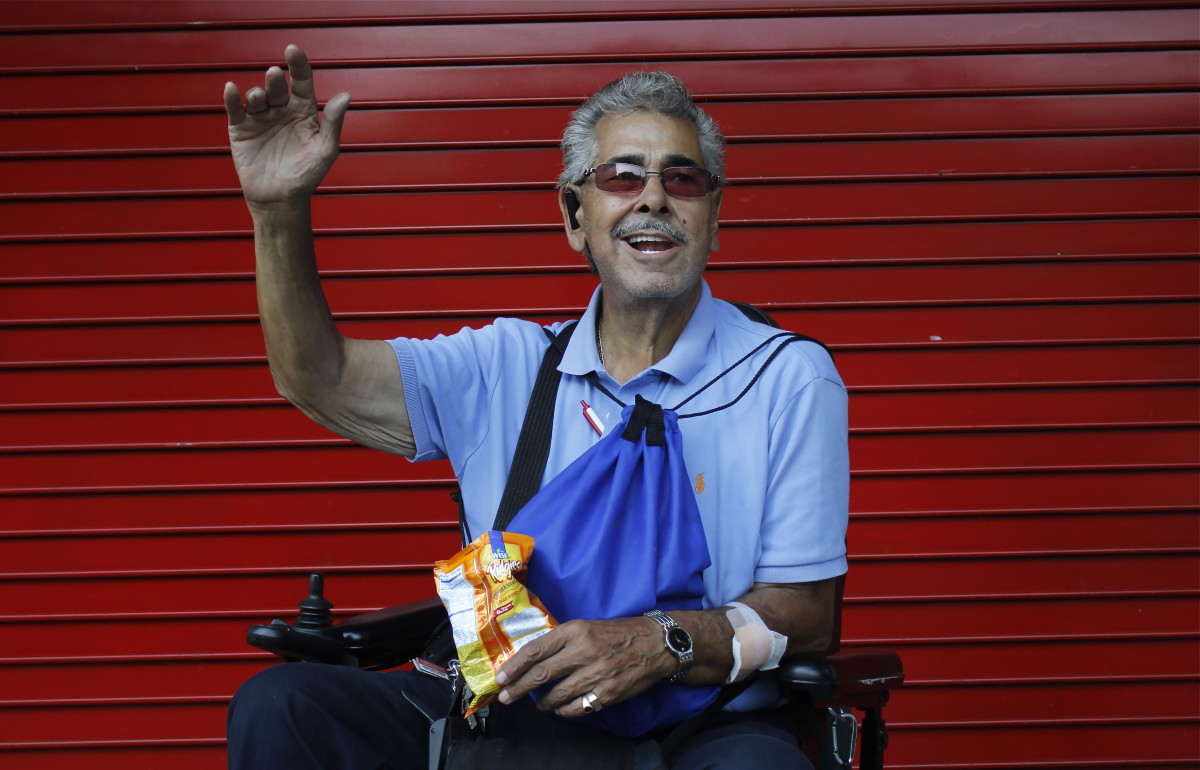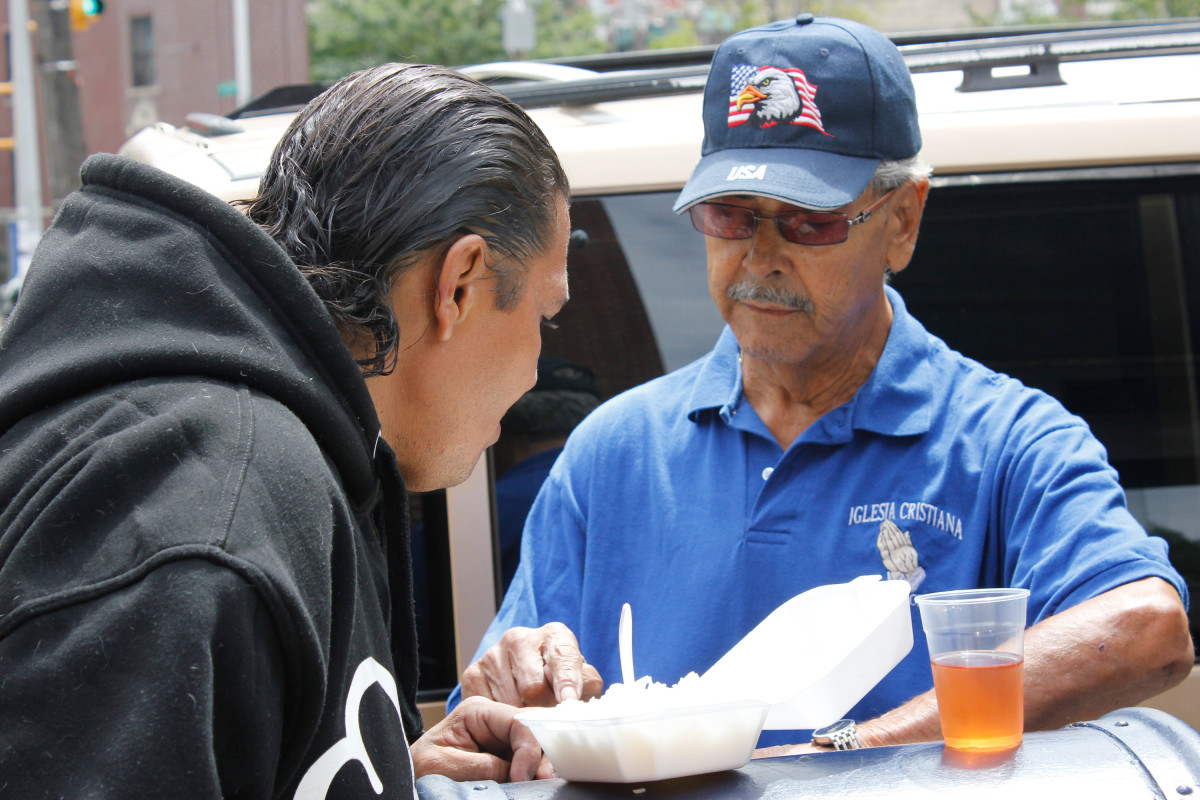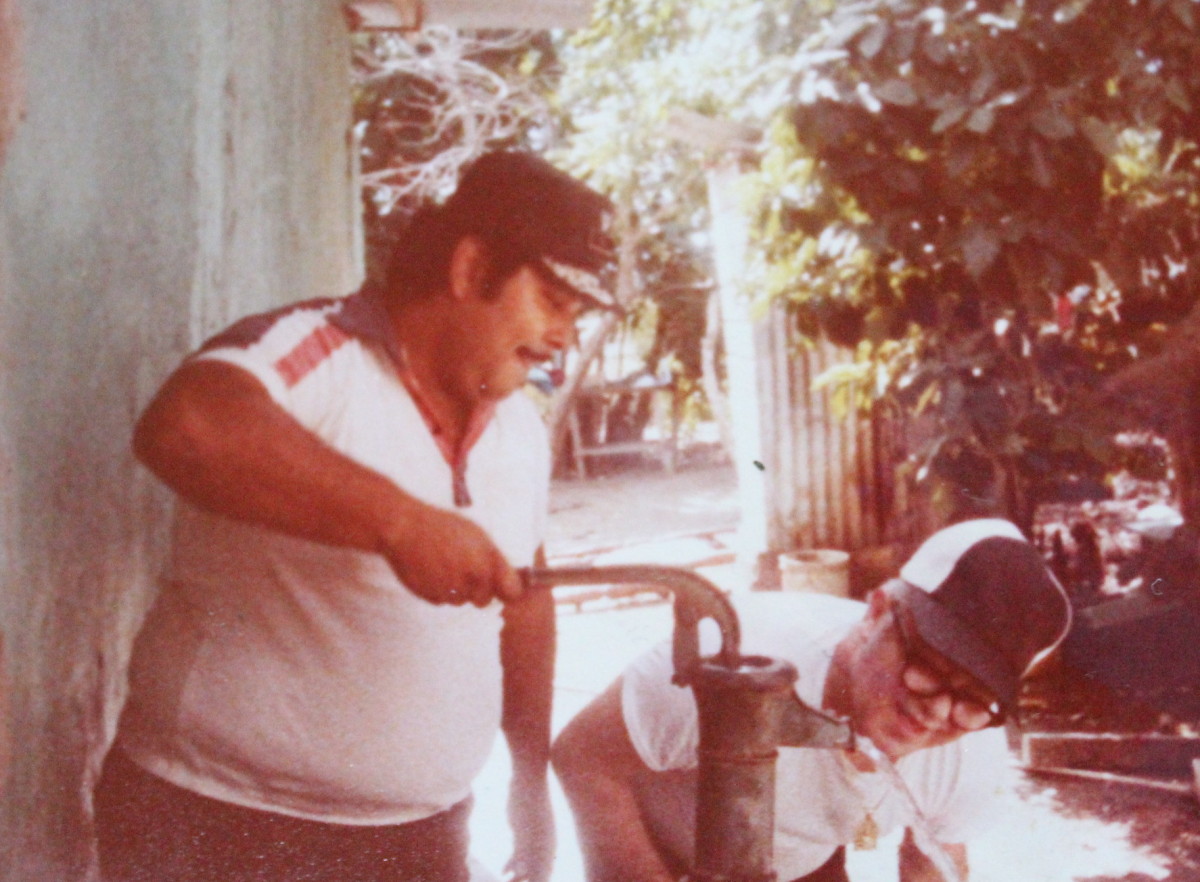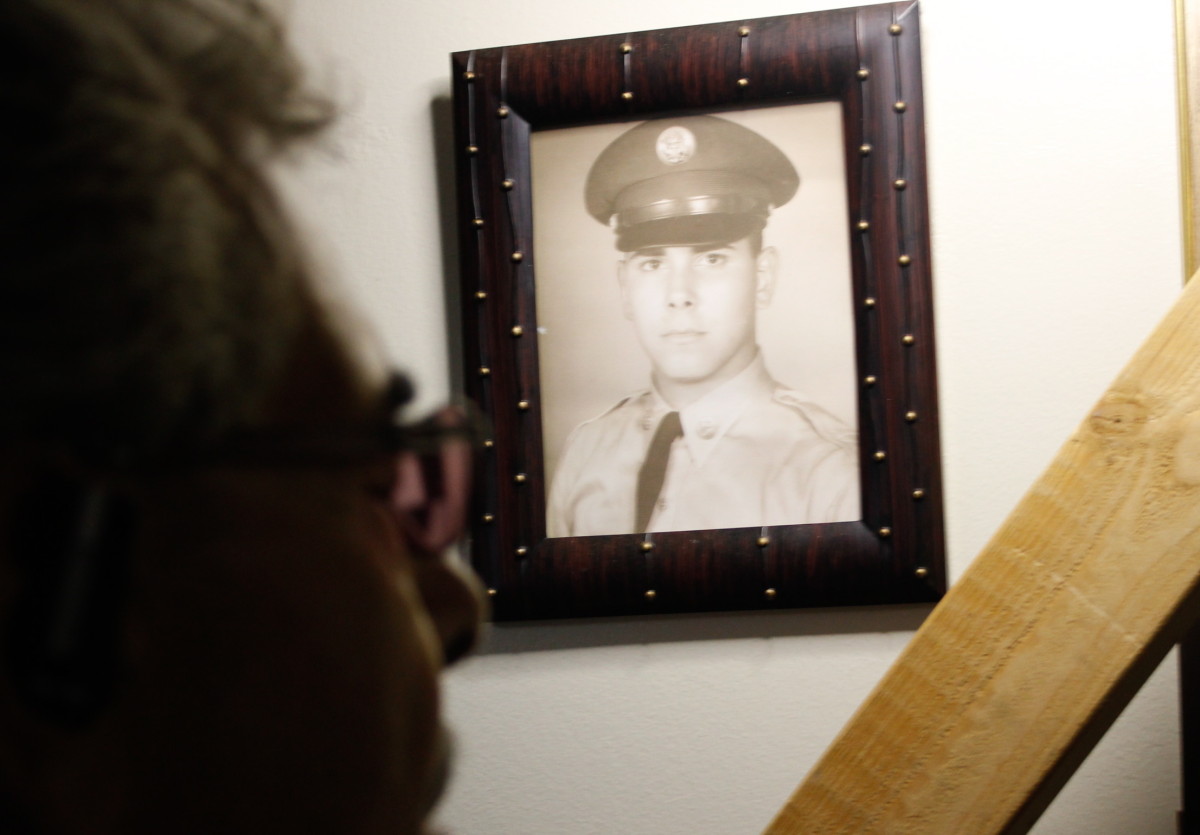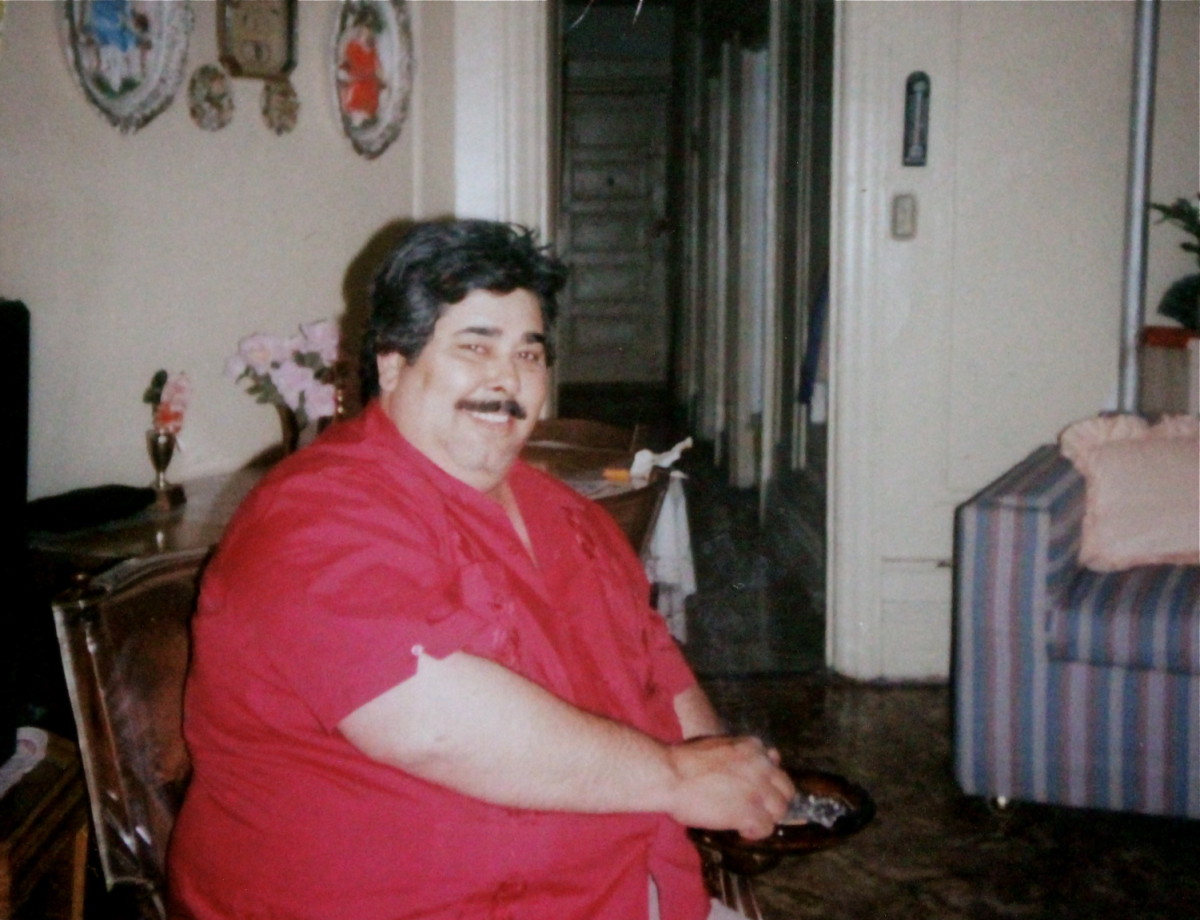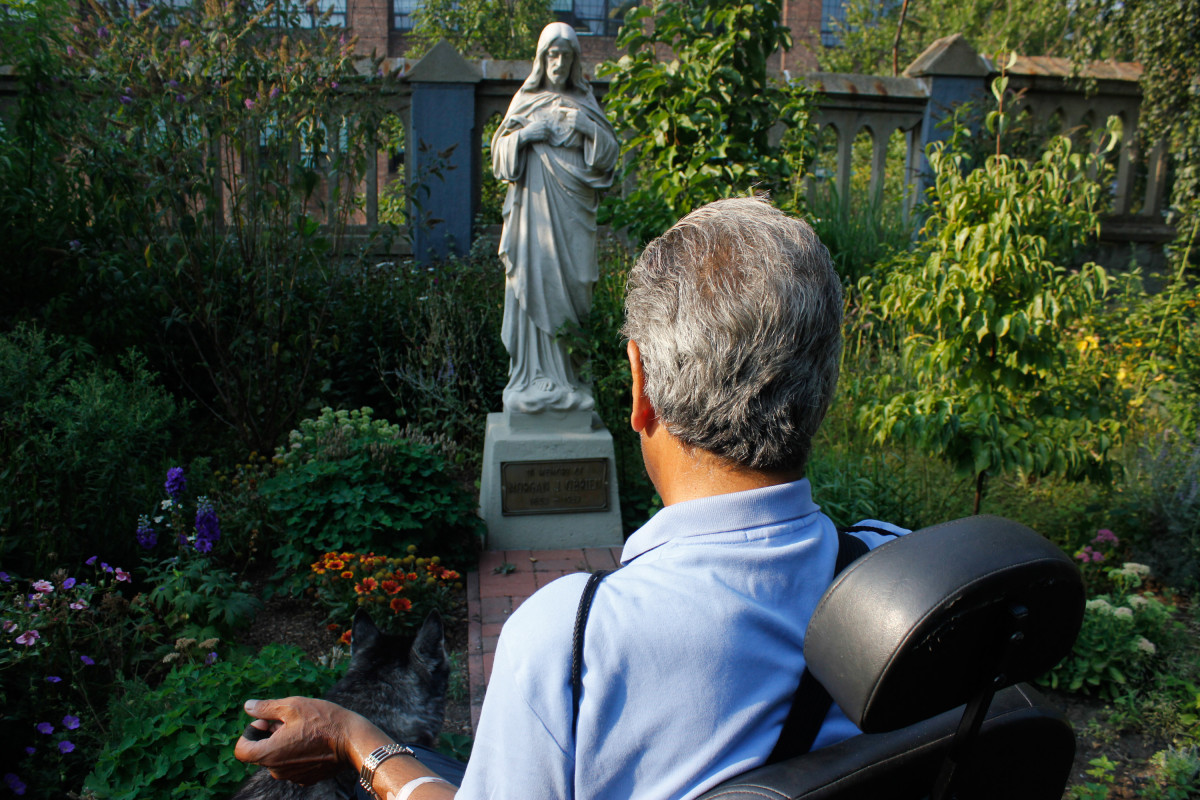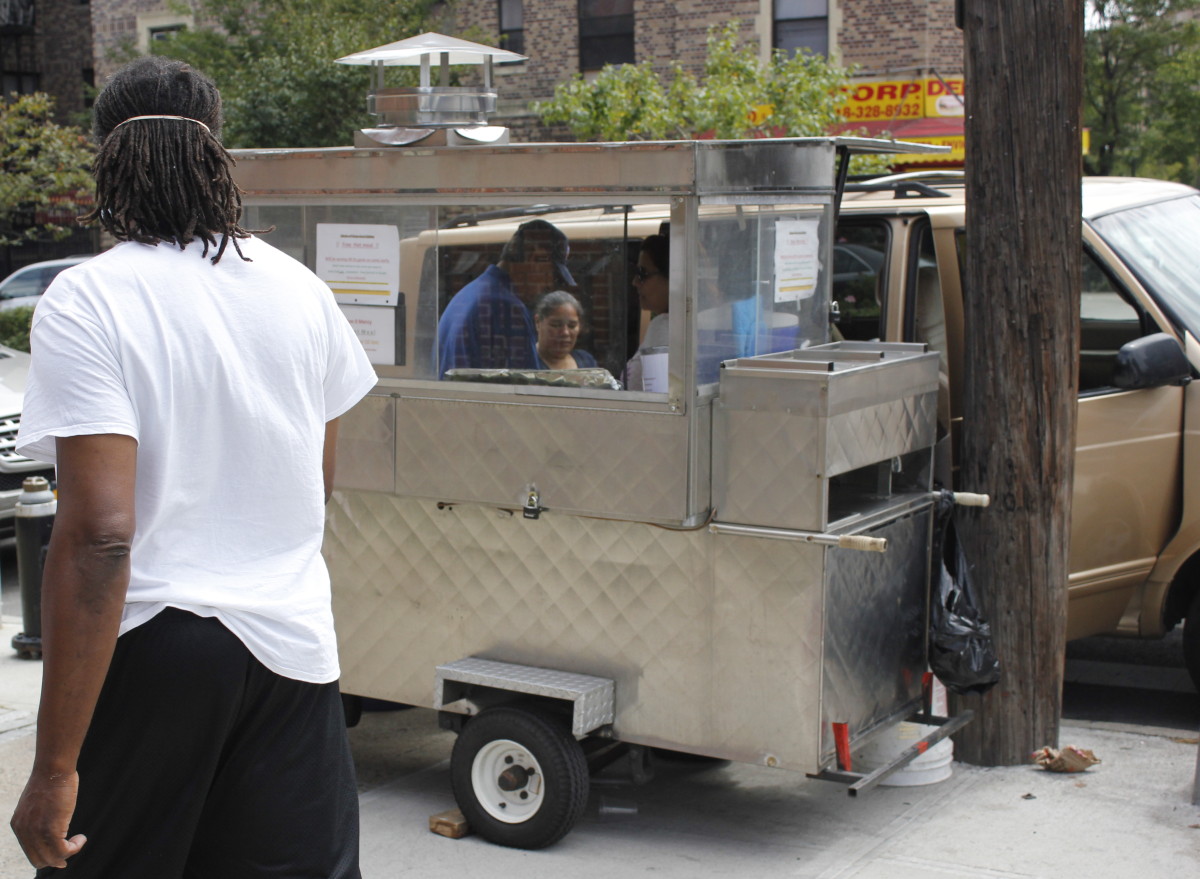It was a sunny Saturday morning in Hunts Point. Seventy-two-year old John Peña strapped on his apron and fired up his food trailer. Hot steam seeped through the trailer’s windows into Lafayette Avenue, carried by the sound of classical music that blasted from his gold Chevy Astron. Now mostly wheelchair-bound, the once towering Puerto Rican military man turned food truck evangelist stood with shaky effort behind the counter, gently swaying side to side to Mozart as he uncovered steaming home-cooked dishes in large aluminum foil pans.
The first hungry customers were gathering at the street corner against the backdrop of the Corpus Christi monastery, the oldest Dominican Abbey in the country. Three homeless men from a nearby drop-in shelter stepped up to the trailer, sharing the last drag of a half-lit cigarette. “Watcha got today, Juan?” one asked impatiently, with a thick Latino accent.
”One more minute, Papi!” Peña replied with a diagonal smile, peering out through his red-tinted glasses. Peña’s boyish face barely betrays his scrappy past. His neat salt-and-pepper moustache is now mostly salt. He wore a navy polo shirt and a matching baseball cap, embellished with a pin of a golden eagle – a reminder of his military past.
Peña forced a sickly cough, slipped on latex gloves and unpacked some plastic cutlery. A minute later, the monastery clock struck 10 a.m. With one last check of his wristwatch, Peña called over his first customer: “What can I get for you, cariño? Some arroz con gandules, potato salad or mexican casserole?”
Peña is a one-man-show at Mission-o-Mercy, his own charitable street ministry that serves up a free weekly meal from a repurposed food trailer–the kind of two-wheeled vehicle that could be found on any given Manhattan street corner, selling hot dogs, Danish or Halal skewers.
Peña has a long, distinguished and checkered career as an army man, a community organizer and a law enforcement officer over the last seven decades, much of it spent in the Bronx. The free food truck is his most recent venture and it has been up and running since July, serving local Hunts Point residents from the morning hours until all of the food runs out. His policy is that everyone – wealthy or needy, young or old – gets exactly one plate for free. No exceptions. No questions asked.
“Once you give them a finger, they want the whole hand,” Peña said as he slapped some rice and beans into Chinese takeout-style foam boxes.
Peña loves doing “the lord’s work” with his solo non-profit. A small printout taped to the side of his food trailer reads: “Come Eat Free. God provides.” The born-again Christian is a certified chaplain, a layperson trained to console people in times of crisis. When he’s not directly feeding his customers, he spends much of his day listening to their problems. One homeless man lamented his inability to acquire the newest HIV medicine after wolfing down a Peña-provided meal. Another man pushing an orange shopping cart told the professional listener about his wife’s impending transfer to Rikers after she was arrested for drug possession. There are many similar stories throughout Hunts Point, a low-income neighborhood still known for its gang-infested, prostitute-ridden history.
“My mission is all about nourishing the souls of these people,” said Pena, with a powerful, sermon-like cadence. “There are many ways to do that, physically and spiritually.”
Peña is far from a rich man, living out his autumn years as a local food philanthropist. In addition to receiving Medicare and Medicaid, Pena lives off $956 in Social Security benefits and $121 dollars in Food Stamps. Peña said he uses most of the money for rent, a bare minimum of personal groceries, car insurance and cable television. Whatever is left over goes into the mission. This includes fresh ingredients for next week’s dishes and paying off a $4,000 bank loan for the second-hand food trailer he bought and rebuilt to his liking. “I don’t know how I do it,” he said, “but somehow I manage to pull it off every week.”
Most weeks, Peña receives cooking help from other community and church members in one way or another. He asks them to make whatever they like. Whether they bring white rice and or fancy salmon burgers, somebody in Hunts Point is always hungry. “We all love John,” said Raquel Welch, who promised to return the favor by bringing her famous Mac and Cheese the following Saturday.
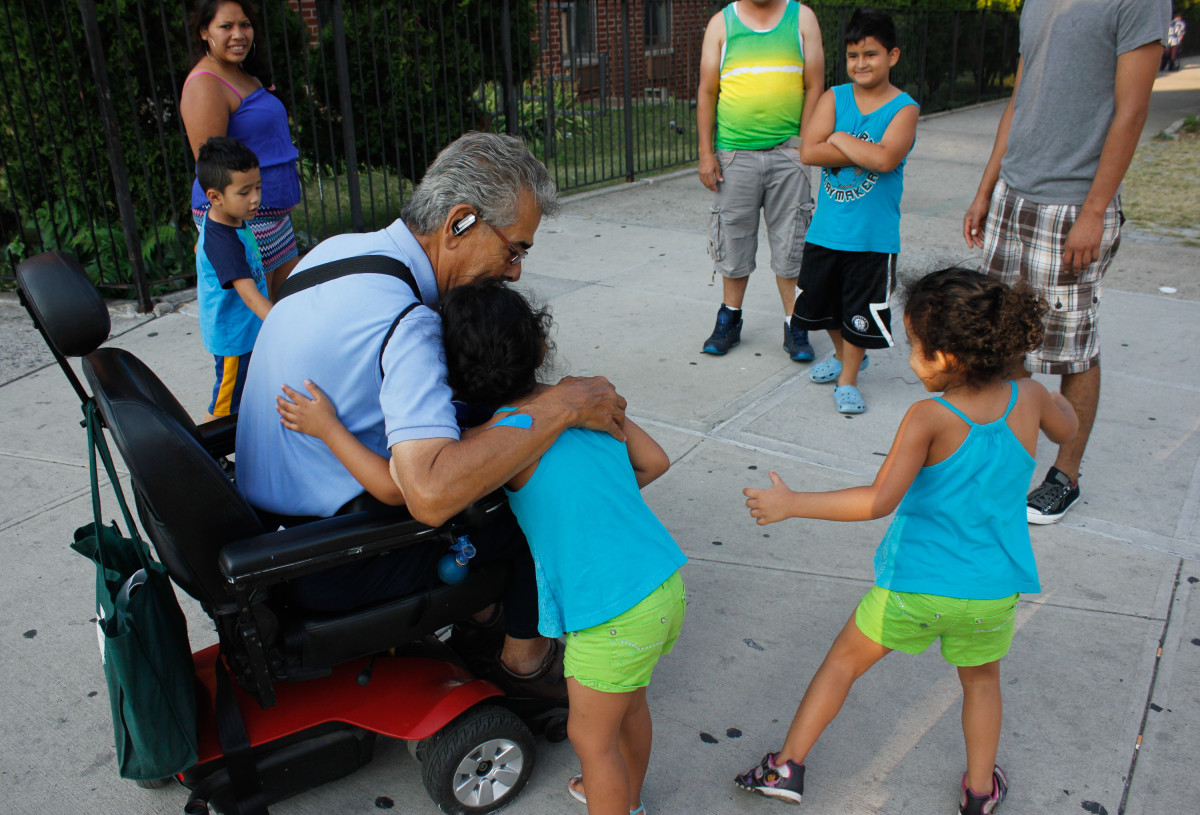
Local hero Pena is welcomed by two twins from the Hunts Point neighborhood. They call him ‘Abuelo Amigo’ – friendly grandfather.
Though the food is always free at Mission-O-Mercy, Peña does take donations. He keeps a roughed-up, gray cardboard box tucked away in his truck that looks more like an elementary school art project gone awry than a donation container. Once in while he will mention it in conversation, but the last thing he wants is for people to assume that he is hungry for their money. At the end of that September day, Peña fed close to 170 people and will have collected a mere $11.47 in donations. “At least it’s more that last week,” he chuckled, raising his eyebrows.
Though Peña is sick and disabled, he believes his work is more important than the physical pain he endures day after day. The former 400-pound gourmand has been suffering from prostate cancer, heart problems and diabetes for some time now and has recently shed over half his weight. He now enjoys food vicariously through his customers at his free Hunts Point Brunch. “I used to love to eat,” he said licking his lips. “But I don’t ever have an appetite anymore, so it’s great to see that others can enjoy my food.”
Peña lives in a overcrowded two-room apartment in an affordable senior housing complex, just steps away from where he serves food. Inspired by his Christian faith, he shares the living-room with creatures from sky, sea and land: a sharp-nosed Siberian Husky, four chirpy birds in stacked cages, a pet goldfish and a vertical garden that blocks much of his living room window. The little space that remains is obstructed by cooking hardware, canned goods and tangible memories of his many former lives. Most of his cooking for his ministry is done right here.
A perfectionist at heart, Peña sets himself very high standards when it come to his menu selection. “Either I do it right or I don’t do it at all.” Many nights he lies in his trapeze-assisted bed watching the Food Network or scours the online recipe world, concocting nutritious and culturally diverse dishes for the upcoming weeks. Other Saturdays he has served Vegetable Lo Mein with cheese, Tuna with West Indian Noodles or baked ziti.
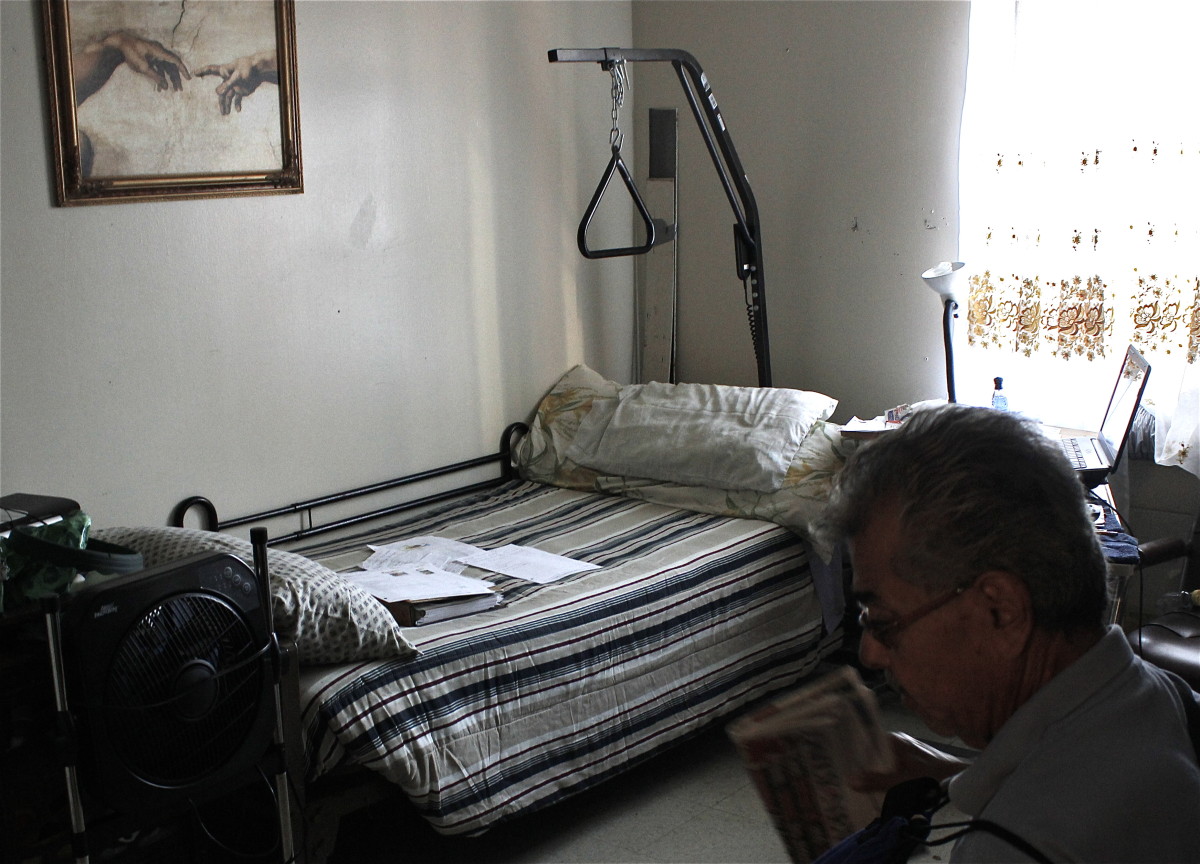
John Pena’s bedroom in his two-room apartment in Hunts Point. Religious motifs and printed online recipes are scattered throughout.
“The other week I did this Paella,” he said, flipping through his self-made cookbook, a random selection of handwritten recipes, internet printouts and magazine cut-outs. “But I turned it around. In Spain they use seafood, but I couldn’t afford that so I used chicken instead.” He likes to do it the Frank Sinatra way. “I just do it my way – Peña style.”
In fact Peña has always done things his own way – for better or for worse. Whether as a community cop, an anti-poverty consigliere or now as a food minister, Pena brings all his volatility, his devil-may-care attitude, his free spirit and faith, but also his many regrets to his lifelong commitment to giving back to his world and his community. The father of eight says he now lives a simple life, but he is far from a simple soul. His story is filled with many paradoxes. It’s a tale as rich, messy and inspiring as the history of the Bronx itself: one step forward, two steps back, three steps forward, two steps back.
Like Mother and Father, Like Son
Born in 1942 in Bayamon, Puerto Rico, Peña moved to New York when he was five-years-old and spent much of his early childhood in a military academy. “They really didn’t play games there,” he said. “I was a rowdy little guy, so my mother sent me there. But they drilled that right out of me.”
At age 12, Peña returned to the South Bronx to live with his mother and stepfather in a small apartment on Leggett Avenue. His mother, Mercedes, the namesake of Mission-O-Mercy, has always been his spiritual guide; the yang in his life. She owned a candy shop in Longwood and Peña helped her out most days after school. His father had left the two of them years earlier for another, richer, woman and a job at Bethlehem Steel corporation in Baltimore, Maryland.
“I have my mother’s soul, but my father’s temperament,” said Peña.
His stepfather, a late-shift musician at Central Park’s Tavern on the Green, came home drunk most nights. “One night he hit my mom,” Peña remembers, his face hardening. “I was around 15 at the time and that night I just beat the living crap out of him.”
Good Evening Vietnam
His stepfather threw him out of the house and he moved to Baltimore to live with his father. On his 17th birthday in 1959, he asked for his father’s permission to sign up for the army. “They’ll make a man out of you,” were his father’s departing words.
After finishing basic training in Fort Jackson, South Carolina, and a two-year stint in post-war Korea, Peña was shipped to the “boondocks” in Vietnam. He said he can’t remember much from his time in the Mekong Delta, other than a daze of jungle heat, cigarette smoke and a bullet to the elbow that sent him home only months after he arrived. “They called it the million dollar bullet. No permanent damage and no war,” he said, pulling up his sleeves and pointing to a slight disfigurement in his right arm.
Back on American soil in Fort Benning, Georgia, things quickly took an ugly turn. Peña was involved in a physical altercation with his higher-ranked officer. “This jerk kept calling me a dirty Puerto Rican, so I balled up my fists,” he said, clinching his fists to recreate the moment. “Then he touched my nose and kept on saying ‘Whatcha gonna do?’ So I just hit him. Next thing I know, the sergeant is running at me and I swing at him too.” Though he said he stood up for what he thought was right, he admitted now that it was a misguided decision, having lost him any entitlement to future Veteran benefits.
Days of Power and Influence with Ramon Velez
In 1964, the 22-year old nomad returned to the Bronx and married his girlfriend, Consuelo, the mother of his first three children. Pena remembered being shocked at how bad things were in the Bronx back then. “It looked worst than Vietnam,” Pena recalled. “Garbage piled up to the second floor, everybody shooting at each other and kids selling all kinds of drugs. It was the Wild, Wild South.”
The same year Ramon Velez, the scandal-scarred South Bronx powerbroker, plucked jobless Peña from the streets to join his team at the infamous social services agency, Hunts Point Multi Service Center. Peña had stumbled into an ad-hoc political rally organized by Velez and said he openly questioned the organization’s work in the community. The next day Velez offered him a job. “He liked my ideas and my spirit,” said Pena.
Three years later Pena was promoted to head the newly-formed Management Information Systems department. He was responsible for a team of 35 employees that gathered demographic data on the South Bronx. Peña reported directly to Velez, who then used this information to help build his poverty program empire, one that included hundreds of employees, thousands of clients and nearly $300 million in government funds for health clinics, housing developments and drug-related services. The FBI routinely investigated the so-called South Bronx “poverty pimp” for lining his own pockets with poverty dollars, but he was never charged for any wrongdoing.
Peña claims that Velez, famous for using his non-profit networks to groom politicians, wanted “to fix me up too like he did other Puerto Ricans in the area.” It wasn’t his world. “I never wanted to say or do anything to look good. I just like to be me – without wheelin’ and dealin’. God knows you can’t do that as a politician.”
In 1972, Peña’s marriage broke down and he abandoned his children and the lucrative position in Velez’ innermost circle. He left for Puerto Rico, where he got involved with his stepfather’s niece, Christina. He fathered another five children, but eventually would leave his second family too.
Peña regrets not having been a better father. “I’m sad that I never lived the American dream – house, family, children and all,” he said about his fractured private life. “I often took the easy way out.”
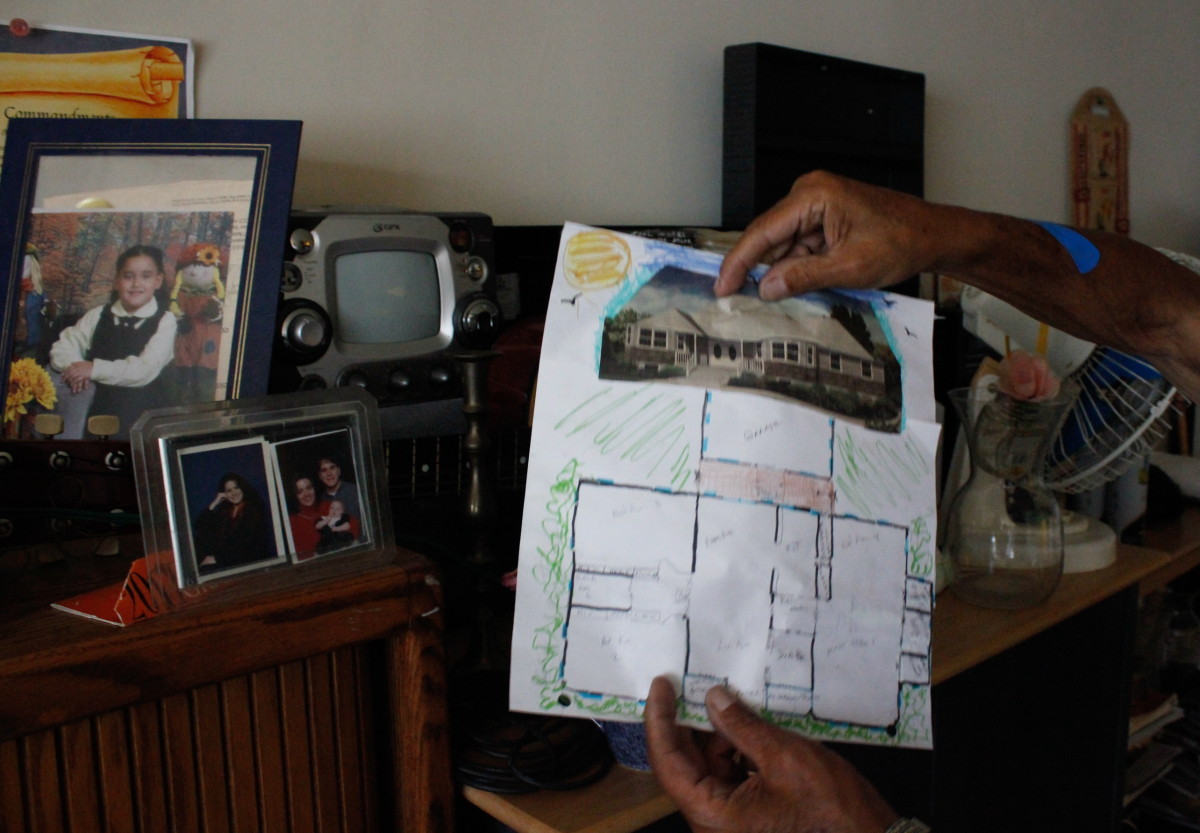
Pena sketches an outline of the house he always dreamed of having.
His daughter, Carrie Pena, a Harvard graduate who now lives in Orlando, Florida, said that she had little contact with her father growing up. Today they have rekindled their relationship. “I love him like a family friend, but not like a father,” said Carrie, a lawyer and mother of two. Almost all of his children are service-minded, Carrie said about her siblings, a quality they inherited from their father. Two of Pena’s sons from his second family are succesful military men.
In 1985, Pena returned to Longwood to take care of his now-widowed mother. Eventually, his mother ended up taking care of him. Almost 400 pounds and a chain smoker at the time, Pena’s health had deteriorated over the years. He had all the health problems associated with obesity: diabetes, sleep apnea, heart problems, just to name a few. Severely depressed and bedridden most of the time, his life once again took a dramatic turn in 1997.
His mother, who had only then recently turned to God, persuaded Peña to attend church with her. Peña said he mostly spent these Sundays outside smoking cigarettes. Much of what happened next is still a mystery to him. “I was sitting in the back, bored as hell, when BAM! My lights just went out,” he said, snapping his fingers to heighten the drama. “Next thing I know, I’m lying up front at the altar, tears streaming down my face and accepting Jesus Christ as my lord and savior.” A few weeks later, born-again Peña and his mother got baptized together at the New Jerusalem Church in Brooklyn.
“I am not religious,” Peña said, pausing to find the right words. “But I do have a personal relationship with Jesus Christ.” After his conversion, his health slowly improved and in 2000 Peña was ordained a community chaplain by the Latin American Chaplains Association.
Navigating Through Life
In 2003, Pena teamed up with the Hunts Point Economic Development Corporation to direct the Neighborhood Navigator program. Peña had more than a dozen volunteers working for him, and together they acted as pseudo-watchdogs over the community, putting out fires wherever needed. “We were like cops without weapons,” he said. The only weapons Peña had at his disposal were his persuasion skills and the unshakable passion to better his community.
Peña said he helped the effort to block off all streets coming in and out of the Hunts Point peninsula at night, an NYPD tactic that helped keep drug dealers and prostitutes off the streets and allowed for the area’s slow but steady recovery over the recent years.
Soon after, Peña began using this influential position to further his chaplaincy. He charmed local suppliers from the Hunts Point Cooperative Market – today one of the largest food supplying centers worldwide – to donate entire crates of fresh produce and protein that were nearing their expiry date. Pena would stack them in his empty storefront office and hand them out to hungry Hunts Point residents. The program was discontinued in 2007, when Peña was diagnosed with prostate cancer and spent the next years in and out of hospitals.
His portable food enterprise of today is essentially the continuation of the same vision, just on much a smaller scale. “It would be easier if they still knew me down in the markets, but I don’t have the same kind of clout anymore,” Pena said.
Peña still hasn’t given up on his dream of bringing his mission back to its former glory. Like any food-cart owner, he plans to expand and eventually have his own place. In his case, he imagines a restaurant-style soup kitchen for his ministry, where people can get counseling, showers and free clothing as well. “I imagine a place like the Waldorf Astoria. A place with dignity and flowers, where people can feel great about themselves.”
For now, Peña is focused on next Saturday’s menu and – pork shoulder, chicken stew, white rice and lentils.


